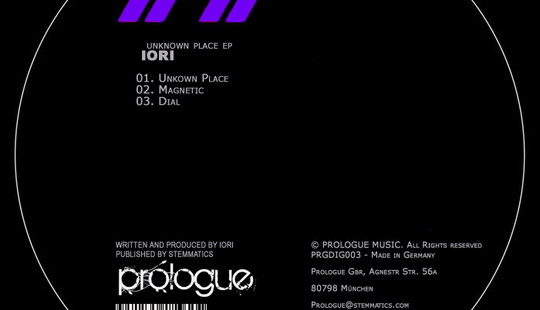Before pushing off into the tumultuous sea of 2010's release schedule, I wanted to draw attention to some excellent releases from the tail-end of last year that, by dint of being released when I was either carefully planning or actually engaging in typical Christmas pursuits, such as infiltrating 11kg turkeys and eating my way out, sort of got left behind.
Before we get to the reviews, it's with real pleasure that I unveil the 4th edition in the armchair dancefloor mix series, which comes from Antwerp's Kreng. His debut album, L'Autopsie Phénoménale De Dieu (see ad008) was one of my favourite releases of last year, and his 22 Keys to the Kingdom outlines some of the music that lay behind it. In his own words:
I was asked by armchair dancefloor to make a compilation that would highlight the music that inspired me for my first album L’Autopsie Phenomenal De Dieu, on Miasmah Records. Here you can find a small selection of compositions and/or performances that are important to me. There’s a bit of everything in here: old vintage blues recordings, 70’s Giallo soundtracks (Italian cinema at its best!), high brow modern classical stuff, a Kreng-composition exclusive to this compilation, obscure movie trailers, a very passionate kitschy tango by Les Baxter, a torch song featuring Fats Waller on organ, and some timeless works by Bach & Purcell.
Please enjoy.
Kreng.
Monolake – Silence (Imbalance)
 The term ‘sound as pornography’ has been used to describe Silence, and it’s an apt one: this is audio design as fetish. Monolake is Robert Henke (with some help from T++, who as co-creator of the music sequencer/DAW system Ableton has had a huge influence on the sound of electronic music in the last decade, as well as putting beat-mixing on the extinction watch list. As an artist, he’s spoken about in the experimental techno community with a reverence that might irritate, but listen to his work and you can understand the beatification. Managing to be both uncompromising and immediate, many Monolake productions are things of great and lasting beauty.
The term ‘sound as pornography’ has been used to describe Silence, and it’s an apt one: this is audio design as fetish. Monolake is Robert Henke (with some help from T++, who as co-creator of the music sequencer/DAW system Ableton has had a huge influence on the sound of electronic music in the last decade, as well as putting beat-mixing on the extinction watch list. As an artist, he’s spoken about in the experimental techno community with a reverence that might irritate, but listen to his work and you can understand the beatification. Managing to be both uncompromising and immediate, many Monolake productions are things of great and lasting beauty.
Silence doesn’t take long to stun, with pops that might be hot metal expanding and the semi-digitised zither flurries of opening duo ‘Watching Clouds’ and ‘Infinite Snow’ thrilling the ear with their strange flavours. It’s not all sui generis: the withheld rhythmic payoffs and clipped edits of ‘Null Pointer’ are redolent of Murcof, and the beat patterns throughout are indebted to dubstep. In truth, though, this is music that makes the mentioning of genres faintly ridiculous; moulding funnelling winds and crackly field recordings, distant gunfire, gaseous drifting tones and mutated traditional instrumentation into extraordinary new forms, Henke is busy working in a space of his own.
Oneohtrix Point Never – Rifts (No Fun)
 Collecting three limited edition releases by the prolific Massachusetts-based synth artist Daniel Lopatin, Rifts is a trove of retro-futurist composition that justifies his shift from sprawling psychedelic epics to shorter, more focused transmissions. And there’s still the occasional 17-minute mindbender like ‘When I Get Back From New York’ for the freaks. Unusually for electronic artists, Lopatin enjoys specifying what his albums are ‘about’. Zones Without People portrays an alien world with similarities to Earth; Betrayed in the Octagon describes a stoned cosmonaut having a bad day, while in Russian Mind we rejoin him years later, composing a film score from his hospital bed in an infirmary from which he looks out over a view of holographic birch trees. I know, I know: when are musicians going to get tired of that one?
Collecting three limited edition releases by the prolific Massachusetts-based synth artist Daniel Lopatin, Rifts is a trove of retro-futurist composition that justifies his shift from sprawling psychedelic epics to shorter, more focused transmissions. And there’s still the occasional 17-minute mindbender like ‘When I Get Back From New York’ for the freaks. Unusually for electronic artists, Lopatin enjoys specifying what his albums are ‘about’. Zones Without People portrays an alien world with similarities to Earth; Betrayed in the Octagon describes a stoned cosmonaut having a bad day, while in Russian Mind we rejoin him years later, composing a film score from his hospital bed in an infirmary from which he looks out over a view of holographic birch trees. I know, I know: when are musicians going to get tired of that one?
Lopatin’s sound owes a lot to Kosmische acts such as Harmonia and Roedelius, and also bears comparison with Boards of Canada. He has a remarkable facility for melody, from the timeless, uplifting arpeggios of ‘Hyperdawn’ to the Ouroboros-like churn of ‘Transmat Memories’ and the celestial rush and recession of ‘Physical Memory’. Whether or not you choose to picture the scenarios Lopatin suggests is up to you, but it’s impossible to resist the gravitational pull of these extraordinary works.
Black to Comm – Alphabet 1968 (Type)
 Released in early November, Marc Richter’s new(ish) album as Black to Comm, Alphabet 1968, has taken up stubborn residence in and around my CD player, and at the time of writing still shows no sign of going anywhere. Interesting from the off, the pull it comes to exert after a few plays is pronounced. A lot of that has to do with the intricate layering of these cracked and battered junkyard tone poems. Before it drains into the processed vacuum cleaner and piano duet of ‘Amateur’, ‘Musik für Alle’ bewitches with its network of strummed and plucked strings, airy and knotty all at once. Much of the album involves drones, but that won’t convey just how organic Richter’s are. The glassy metallic rattle of ‘Houdini Rites’, overhung by a high whine and some wild sawing of what could be a violin – or just as easily a treated can opener – is music of real drama, while ‘Forst’ transforms over the course of ten glorious minutes from a stately pulse into a joyously busy slab of noise.
Released in early November, Marc Richter’s new(ish) album as Black to Comm, Alphabet 1968, has taken up stubborn residence in and around my CD player, and at the time of writing still shows no sign of going anywhere. Interesting from the off, the pull it comes to exert after a few plays is pronounced. A lot of that has to do with the intricate layering of these cracked and battered junkyard tone poems. Before it drains into the processed vacuum cleaner and piano duet of ‘Amateur’, ‘Musik für Alle’ bewitches with its network of strummed and plucked strings, airy and knotty all at once. Much of the album involves drones, but that won’t convey just how organic Richter’s are. The glassy metallic rattle of ‘Houdini Rites’, overhung by a high whine and some wild sawing of what could be a violin – or just as easily a treated can opener – is music of real drama, while ‘Forst’ transforms over the course of ten glorious minutes from a stately pulse into a joyously busy slab of noise.
Iori – Unknown Place EP (Prologue)
 Japanese producer Iori makes his Prologue debut with three pieces of gloomy, tunnelling techno. ‘Unknown Place’, similar in its understated intensity to Roman label-mate Giorgio Gigli’s superb productions of last year, lets its evolutions play out slowly: crunchy handclaps shift the track’s rhythmic centre, while the various shades of grey background tones gradually creep towards the front of the mix before an eerie, trembling melody flickers into life in the track’s final quarter. Equally as enthralling is the mid-tempo, 303-laced ‘Dial’, which balances a delicate, crystalline shimmer of sound atop a robustly wobbling bassline. Dropping the 4/4, Iori generates tension by placing the emphasis on the fragmented off-beat, making this a seriously funky piece of techno.
Japanese producer Iori makes his Prologue debut with three pieces of gloomy, tunnelling techno. ‘Unknown Place’, similar in its understated intensity to Roman label-mate Giorgio Gigli’s superb productions of last year, lets its evolutions play out slowly: crunchy handclaps shift the track’s rhythmic centre, while the various shades of grey background tones gradually creep towards the front of the mix before an eerie, trembling melody flickers into life in the track’s final quarter. Equally as enthralling is the mid-tempo, 303-laced ‘Dial’, which balances a delicate, crystalline shimmer of sound atop a robustly wobbling bassline. Dropping the 4/4, Iori generates tension by placing the emphasis on the fragmented off-beat, making this a seriously funky piece of techno.
Roy Montgomery/Grouper - Split (Root Strata)
 With a guitar style that takes The Velvet Underground and Television as starting points before extending and foregrounding their drone elements to an ecstatic degree, New Zealander Roy Montgomery has worked with Bardo Pond (as 'Hash Jar Tempo', the greatest Star Wars character that never was) and Flying Saucer Attack, as well as being a member of Murder Strikes Pink and Dadamah. His contribution to this split release, ‘Fantasia on a Theme by Sandy Bull (Slight Return)’, is a vast tapestry woven from a single guitar. Nearly 20 minutes long, its roundelay structure generates a huge amount of reverb, which comes to provide its own counterpoint to the ever more ferociously struck strings.
With a guitar style that takes The Velvet Underground and Television as starting points before extending and foregrounding their drone elements to an ecstatic degree, New Zealander Roy Montgomery has worked with Bardo Pond (as 'Hash Jar Tempo', the greatest Star Wars character that never was) and Flying Saucer Attack, as well as being a member of Murder Strikes Pink and Dadamah. His contribution to this split release, ‘Fantasia on a Theme by Sandy Bull (Slight Return)’, is a vast tapestry woven from a single guitar. Nearly 20 minutes long, its roundelay structure generates a huge amount of reverb, which comes to provide its own counterpoint to the ever more ferociously struck strings.
Whereas Montgomery crowds his space, Liz Harris, aka Grouper, mines the silence between her opiate vocals and sparingly plucked notes. Following the extremely beautiful winter plainsong of ‘Hollow Press’, she is like Julee Cruise at her most spartan on ‘Vessel’. ‘Hold the Way’, meanwhile, sends her subtly layered vocals arcing up above hazy guitar notes like distant flares in a fogbound landscape.
Bruce Gilbert – This Way (Editions Mego)
 Ex-Wire guitarist Bruce Gilbert was always considered the most experimental member of the influential post-punk outfit, his experiments with distortion pedals and effects strafing across the band’s trilogy of late-70s albums. This Way was Gilbert’s first solo album, released in 1984 on Mute, and it represents an extraordinary study of minimalist electronic sound. Now remastered, it’s dominated by the half-hour long tripartite composition ‘Do You Me? I Did/Swamp’, first commissioned for a Michael Clark Company dance work, and which is symphonic in scope as well as mere length. Beginning with an extended synthesized choral sample, buffeted by passing drifts of static, granular wind-like sounds and a heavily distorted cry of anxiety, the piece displays Gilbert’s clear talent for dramatically developing electronic compositions. But it’s in ‘Part 3’ of ‘Do You Me...’, with its glowering boom-bap beat and euphoric rave-stab climax – something like Somfay remixing Company Flow – that This Way reveals just how ahead of its time it was.
Ex-Wire guitarist Bruce Gilbert was always considered the most experimental member of the influential post-punk outfit, his experiments with distortion pedals and effects strafing across the band’s trilogy of late-70s albums. This Way was Gilbert’s first solo album, released in 1984 on Mute, and it represents an extraordinary study of minimalist electronic sound. Now remastered, it’s dominated by the half-hour long tripartite composition ‘Do You Me? I Did/Swamp’, first commissioned for a Michael Clark Company dance work, and which is symphonic in scope as well as mere length. Beginning with an extended synthesized choral sample, buffeted by passing drifts of static, granular wind-like sounds and a heavily distorted cry of anxiety, the piece displays Gilbert’s clear talent for dramatically developing electronic compositions. But it’s in ‘Part 3’ of ‘Do You Me...’, with its glowering boom-bap beat and euphoric rave-stab climax – something like Somfay remixing Company Flow – that This Way reveals just how ahead of its time it was.
Klimek – Movies is Magic (Anticipate)
 Although it’s less a series of pieces for imaginary films than it is an inquiry into the techniques and tricks of scoring for the screen, its theoretical basis doesn’t make Movies is Magic any less absorbing. The vertiginously spiralling strings of opener ‘Abyss of Anxiety (Unfolding the Magic)’ slowly broaden out into a heaving smear that recalls the film noir scores of the 1940s; those that borrowed so heavily from Mahler, and in the process established a blueprint followed by the majority of Hollywood's orchestral film composers of the 20th century. Tracks like ‘Exploding Unbearable Desires’ and ‘Pathetic and Dangerous’ present difficult ground to navigate: despite their purpose being to illustrate the emotionally manipulative aspect of sound design, it doesn’t stop the manipulation being any less seductive in the moment. Colliding its meta mamoeuvres into its 'straightforward' satisfactions, then, Movies is Magic proves to be a delightful, slippery creation.
Although it’s less a series of pieces for imaginary films than it is an inquiry into the techniques and tricks of scoring for the screen, its theoretical basis doesn’t make Movies is Magic any less absorbing. The vertiginously spiralling strings of opener ‘Abyss of Anxiety (Unfolding the Magic)’ slowly broaden out into a heaving smear that recalls the film noir scores of the 1940s; those that borrowed so heavily from Mahler, and in the process established a blueprint followed by the majority of Hollywood's orchestral film composers of the 20th century. Tracks like ‘Exploding Unbearable Desires’ and ‘Pathetic and Dangerous’ present difficult ground to navigate: despite their purpose being to illustrate the emotionally manipulative aspect of sound design, it doesn’t stop the manipulation being any less seductive in the moment. Colliding its meta mamoeuvres into its 'straightforward' satisfactions, then, Movies is Magic proves to be a delightful, slippery creation.
Zelienople – Give It Up (Type)
 Having spent the past decade earning comparisons to Talk Talk and Slowdive, on Give It Up Chicagoan three-piece Zelienople conjure their most powerful evocation yet of a vast, oppressive sorrow. The brushed drums and echoing horn of ‘Aging’, tied together with doomy chords, faint dub echoes and Matt Christensen’s miserable vocal, carries echoes of Angelo Badalamenti's work with David Lynch, and sets the tone for much of the rest of the album. Things cheer up with the lilting ragas of ‘Can’t Stop’, wherein the melancholy remains but shakes off its shroud of absolute despair, and 'I Can Put All My Faith in Her', which in some heroin-coated land is number one all year round.
Having spent the past decade earning comparisons to Talk Talk and Slowdive, on Give It Up Chicagoan three-piece Zelienople conjure their most powerful evocation yet of a vast, oppressive sorrow. The brushed drums and echoing horn of ‘Aging’, tied together with doomy chords, faint dub echoes and Matt Christensen’s miserable vocal, carries echoes of Angelo Badalamenti's work with David Lynch, and sets the tone for much of the rest of the album. Things cheer up with the lilting ragas of ‘Can’t Stop’, wherein the melancholy remains but shakes off its shroud of absolute despair, and 'I Can Put All My Faith in Her', which in some heroin-coated land is number one all year round.
Significantly more electronic processes are at work here than on previous albums - the haunting ‘Water Saw’ is effectively a drone track, for example, while throughout fuzzy hums and curious digital artefacts lurk in the spaces between guitar, bass and percussion like phantoms - but the overall atmosphere is still overwhelmingly organic. And for all its bombed-out dazedness, there's a constant focus to these mournful, ethereal hymns that keeps you rapt even when they're at their most trance-like.
Anduin – Abandoned in Sleep (SMTG)
 Not just a river in Middle-earth, Anduin is also becoming a producer of note on the dark ambient scene. Abandoned in Sleep is the Virginian’s first album since his collaboration with Danish label-mate Jasper TX on last year’s superb The Bending of Light. Blending sounds and live performances of his own with samples and collaborations from similarly-minded producers like Xela, Svarte Greiner and the aforementioned Jasper TX, Anduin generates a nocturnal, threat-tinged atmosphere that suggests inexorably swelling panic. I’ve never thought of the harmonica as a particularly menacing instrument, but on ‘Contents of a Black Box’ it seethes like a viper’s nest. Just as surprisingly, ‘Our Future is a Debt’ is dominated by a harrowing chorus of gut-trembling fog horns and distant buoy bells that sound like a shipping lane on the Styx. Amid this inspired darkness the blanket of tears that is ‘Lovers in Transit’ glows with even greater warmth.
Not just a river in Middle-earth, Anduin is also becoming a producer of note on the dark ambient scene. Abandoned in Sleep is the Virginian’s first album since his collaboration with Danish label-mate Jasper TX on last year’s superb The Bending of Light. Blending sounds and live performances of his own with samples and collaborations from similarly-minded producers like Xela, Svarte Greiner and the aforementioned Jasper TX, Anduin generates a nocturnal, threat-tinged atmosphere that suggests inexorably swelling panic. I’ve never thought of the harmonica as a particularly menacing instrument, but on ‘Contents of a Black Box’ it seethes like a viper’s nest. Just as surprisingly, ‘Our Future is a Debt’ is dominated by a harrowing chorus of gut-trembling fog horns and distant buoy bells that sound like a shipping lane on the Styx. Amid this inspired darkness the blanket of tears that is ‘Lovers in Transit’ glows with even greater warmth.
Oren Ambarchi – Intermission 2000 – 2008 (Touch)
 As well as being a solo artist, Melbourne’s Oren Ambarchi has engaged in a huge number of collaborations, the most notable of which are probably those undertaken with Sunn O))): he contributed to both their Black One and Monoliths and Dimensions sets. This retrospective, whose five tracks span an hour, serves as an excellent introduction to his work, and consolidates his position as a fascinating practitioner of guitar abstraction. The understandably named ‘Intimidator’ might seem forbidding at first, but within the brutal constancy of its central tone smaller melodic details can be perceived. It’s white-on-white, no question, but occasional percussive stabs and punches of sub-bass suggest different emphases within the drone, as well as giving the track a glowering momentum.
As well as being a solo artist, Melbourne’s Oren Ambarchi has engaged in a huge number of collaborations, the most notable of which are probably those undertaken with Sunn O))): he contributed to both their Black One and Monoliths and Dimensions sets. This retrospective, whose five tracks span an hour, serves as an excellent introduction to his work, and consolidates his position as a fascinating practitioner of guitar abstraction. The understandably named ‘Intimidator’ might seem forbidding at first, but within the brutal constancy of its central tone smaller melodic details can be perceived. It’s white-on-white, no question, but occasional percussive stabs and punches of sub-bass suggest different emphases within the drone, as well as giving the track a glowering momentum.
More conventional emotional triggers can be found on album-exclusive ‘Iron Waves’ (Ambarchi’s remix of Paul Duncan’s ‘Parasail’), the vocal of which rides a queasy wire of muted dissonance. Darker still, ‘Moving Violation’ and ‘The Strouhal Number’ give off a murky light of uncertainty shading into paranoia. They serve to build towards the epic buzzing vistas of ‘A Final Kiss on Poisoned Cheeks’, a literally and figuratively stunning noise symphony that eventually crests and breaks into an extended contemplative fade into silence.
One more thing before we go: how would you like the chance to DJ on the same bill as Derrick May, Grandmaster Flash and Joy Orbison at the BLOC Weekend in March? A little bit? A lot? Go on, you're among friends. It's a lot isn't it?
Well, Mixcloud, in conjunction with London promoters Man Make Music and BLOC Weekend, are offering just that. Summon forth the apporopriate greatness from the 1's and 2's and the slot, and perhaps a glittering future of deadly DJ manoeuvres executed at exotic locales around the world will be yours. Scoot over to Mixcloud to find out more.
Chris Power occasionally tweets






















